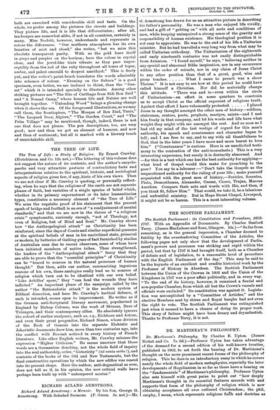RICHARD ACLAND ARMSTRONG.
G. Armstrong has drawn for us an attractive picture in describing his father's personality. He was a man who enjoyed life vividly, and had a gift of "getting on" with all sorts and conditions of men, while keeping unimpaired a strong sense of the gravity and responsibility of human existence. His theological position it is not easy to appreciate. He was to the and of his life a Unitarian Minister. But he had travelled a very long way from what may be called Unitarian orthodoxy. The Unitarianism of the eighteenth and early nineteenth centuries was not easily distinguishable from Arianism. "I found myself," he says," believing neither in any special and abnormal Bible inspiration, nor in any occurrence within the order of miracle, nor in any claim of Jesus Christ to any other position than that of a great, good, wise and pious teacher What I came to preach was a sheer Theism." It is not easy to see how at this period he could have called himself a Christian. Nor did, he materially change this attitude. "There was and is—even within the circle of Unitarianism—an effort in some quarters to constrain us to accept Christ as the official exponent of religious truth.
Against that effort I have vehemently protested I placed Jesus in my thought aino'ngst the other men of history—soldiers, statesmen, orators, poets, prophets, martyrs, saints—and I met him freely in that company, and let his words and life have what weight they might with me amongst the rest. And as soon as I had rid my mind of the last vestige of regard for this man's authority, his speech and countenance and character began to tell; and I am free to say, and to say with all thankfulness to God, that in the later years I have more and more learnt to love him." ("Countenance" is curious. Here is an unsolicited testi- mony to the contention of the anti-iconoclasts.) This is a very interesting experience, but surely it is distinctly abnormal. And —for this is a test which one has the beet authority for applying— what kind of Gospel would this make for preaching to the poor? You say to a labourer :—" Don't take the Gospels as the unquestioned authority for the ruling of your life ; make yourself acquainted with the great men of history,—Pericles, Socrates, Plato, Demosthenes, Alexander, Caesar, Cicero, Trojan, Marcus Aurelius. Compare their acts and words with His, and then, if you think fit, follow Him." That would, we take it, be a laborious and unfruitful ministry. But in Hope Street Chapel, Liverpool, it might not be so barren. This is a most interesting volume.






























































 Previous page
Previous page